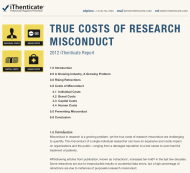If you read about scientific fraud in the recent news, it would seem that there is much to worry about. It's on the rise, apparently! There has been a 10-fold increase in the number of retracted papers since the 1970's, and a number of these are due to fraud or suspected fraud.
An investigation of retractions from the biomedical scientific literature database PubMed published in the prestigious Proceedings of the National Academy of Science USA (PNAS) found that a whopping 63.2% of health- and life-science related retractions were due to fraud, suspected fraud or plagiarism, with good old honest error retractions in the sound minority. This sounds scary – especially the 'suspected fraud'. Is this just the tip of the scientific deceit iceberg? Just how many lies are lurking in the scientific literature?
Then there are the stories. Professor Marc Hauser (formerly) of Harvard was accused by the U.S. Department of Health and Human Services's Office of Research Integrity of inventing results to support his idea of a biological foundation for cognition in monkeys – specifically if they could recognize changes in sound patterns like human babies can. Hauser was a popular scientist too; he even has a best-selling book: Moral Minds: How Nature Designed Our Universal Sense of Right and Wrong where he somewhat ironically argued that "policy wonks and politicians should listen more closely to our intuitions and write policy that effectively takes into account the moral voice of our species." Which worked out in his case; he was busted for scientific misconduct. His book also tells us that "our ability to detect cheaters who violate social norms is one of nature's gifts". Nature's gifts or not, his students and research assistants blew the whistle.
And this isn't just in life science, it's everywhere. Physics has its high profile cheaters too! There is Jan Hendrik Schön, the physicist who made up his data – 26 of his papers have been retracted and he has been stripped of his doctoral degree. And then there is the cold fusion boys who, to be fair, are probably more victims of faulty equipment and sticking to your beloved theory despite the facts, than perpetrators of actual fraud. Psychology is not immune either; Dirk Smeester, whose results seemed too good to be true, has also been caught just making stuff up.
Is no scientific discipline safe? Are scientists just incapable of keeping their modern houses clean? It has been argued that because of recent pressure for scientists to publish groundbreaking results that change the world, the temptation to commit fraud is perhaps bound to increase, implying that there was a simpler, more honest time for science. Dewy-eyed, there is a temptation to believe that scientists back in the day were only of high moral character and were purely duty-bound to pursue the truth. But this isn't really true. Fraud in science isn't new, just like fraud in anything isn't new.>>>
An investigation of retractions from the biomedical scientific literature database PubMed published in the prestigious Proceedings of the National Academy of Science USA (PNAS) found that a whopping 63.2% of health- and life-science related retractions were due to fraud, suspected fraud or plagiarism, with good old honest error retractions in the sound minority. This sounds scary – especially the 'suspected fraud'. Is this just the tip of the scientific deceit iceberg? Just how many lies are lurking in the scientific literature?
Then there are the stories. Professor Marc Hauser (formerly) of Harvard was accused by the U.S. Department of Health and Human Services's Office of Research Integrity of inventing results to support his idea of a biological foundation for cognition in monkeys – specifically if they could recognize changes in sound patterns like human babies can. Hauser was a popular scientist too; he even has a best-selling book: Moral Minds: How Nature Designed Our Universal Sense of Right and Wrong where he somewhat ironically argued that "policy wonks and politicians should listen more closely to our intuitions and write policy that effectively takes into account the moral voice of our species." Which worked out in his case; he was busted for scientific misconduct. His book also tells us that "our ability to detect cheaters who violate social norms is one of nature's gifts". Nature's gifts or not, his students and research assistants blew the whistle.
And this isn't just in life science, it's everywhere. Physics has its high profile cheaters too! There is Jan Hendrik Schön, the physicist who made up his data – 26 of his papers have been retracted and he has been stripped of his doctoral degree. And then there is the cold fusion boys who, to be fair, are probably more victims of faulty equipment and sticking to your beloved theory despite the facts, than perpetrators of actual fraud. Psychology is not immune either; Dirk Smeester, whose results seemed too good to be true, has also been caught just making stuff up.
Is no scientific discipline safe? Are scientists just incapable of keeping their modern houses clean? It has been argued that because of recent pressure for scientists to publish groundbreaking results that change the world, the temptation to commit fraud is perhaps bound to increase, implying that there was a simpler, more honest time for science. Dewy-eyed, there is a temptation to believe that scientists back in the day were only of high moral character and were purely duty-bound to pursue the truth. But this isn't really true. Fraud in science isn't new, just like fraud in anything isn't new.>>>







